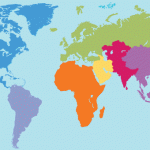 I heard John Claxton from the European Commission speaking last week on the participation on International Cooperation Countries (ICCs) in Horizon 2020 (These countries include Brazil, the USA, China and so on).
I heard John Claxton from the European Commission speaking last week on the participation on International Cooperation Countries (ICCs) in Horizon 2020 (These countries include Brazil, the USA, China and so on).
ICCs have been able to participate as EU members in the FP7 schemes most relevant to us at BU and indeed some calls for proposals have actually targeted these countries for participation. This targeted approach has reduced over the last 2 years of FP7, with instead just a general encouragement to engage with these countries which may be an indication for Horizon 2020. Figures show that 2.5% of the total budget goes to third countries, and one in 5 accepted proposals has a third country participant.
The 5 ICCs which participate most in FP7 in highest to lowest are Russia, the USA, India, South Africa and Brazil. And the programme which has a huge number of ICC participants is Marie Curie, with a whopping 12,000 researchers coming into the EU from ICCs.
The EU is currently revising the international cooperation policy between Member States and the rest of the European Union through committees such as the Strategic Forum for International Science and Technology Cooperation. These groups are trying to develop more coherence and synergies between ICCs and the EU Member States and have already launched pilot work with India, China, Latin America, Africa, the Caribbean and the USA and will be working on Brazil and Russia over the following year.
So what has sparked this change? Well most societal challenges are global in nature, especially those under focus in the proposed Horizon 2020. The EU needs to get access to ICCs working in similar areas and we need access to their markets. We also need to build a critical mass for tackling global challenges through resource pooling and risk sharing in order to lead to more possibilities for breakthroughs and innovations.
And what is the EC doing about it? The EC has recognised that the EU needs to engage more strategically and actively in international cooperation so has been developing more targeted approach. For Horizon 2020, the EC are aligning their societal challenges and enabling technologies with the rest of the world, looking at issues such as infrastructures, patents, publications, access to markets etc. More specifically there will be funding opportunities for ICCs within the proposed Horizon 2020. Under Societal Challenges and Industrial Leadership there will be the targeting of specific countries or regions based on common interiors and joint calls and co-funding of programmes with Third Countries. Under Excellent Science the will be specific fellowships designed to stimulate innovation, the development of global research infrastructures and of course the European Research Council and Marie Curie programmes will remain open to all countries globally. Finally under dedicated cross-cutting actions there will be support for bilateral, multilateral and bi-regional policy dialogue, network and twinning activities and other policy initiatives.
The final stages of ICC development under Horizon 2020 includes reinforcing partnerships between the EC and Member States, strengthening implementation, governance and evaluation, identifying areas for targeting and developing roadmaps with key partners.
So it looks as though ICCs will be incorporated even further into Horizon 2020 which is great for those of you with partners outside of the EU!











 Beyond Academia: Exploring Career Options for Early Career Researchers – Online Workshop
Beyond Academia: Exploring Career Options for Early Career Researchers – Online Workshop UKCGE Recognised Research Supervision Programme: Deadline Approaching
UKCGE Recognised Research Supervision Programme: Deadline Approaching SPROUT: From Sustainable Research to Sustainable Research Lives
SPROUT: From Sustainable Research to Sustainable Research Lives BRIAN upgrade and new look
BRIAN upgrade and new look Seeing the fruits of your labour in Bangladesh
Seeing the fruits of your labour in Bangladesh ECR Funding Open Call: Research Culture & Community Grant – Apply now
ECR Funding Open Call: Research Culture & Community Grant – Apply now ECR Funding Open Call: Research Culture & Community Grant – Application Deadline Friday 12 December
ECR Funding Open Call: Research Culture & Community Grant – Application Deadline Friday 12 December MSCA Postdoctoral Fellowships 2025 Call
MSCA Postdoctoral Fellowships 2025 Call ERC Advanced Grant 2025 Webinar
ERC Advanced Grant 2025 Webinar Update on UKRO services
Update on UKRO services European research project exploring use of ‘virtual twins’ to better manage metabolic associated fatty liver disease
European research project exploring use of ‘virtual twins’ to better manage metabolic associated fatty liver disease